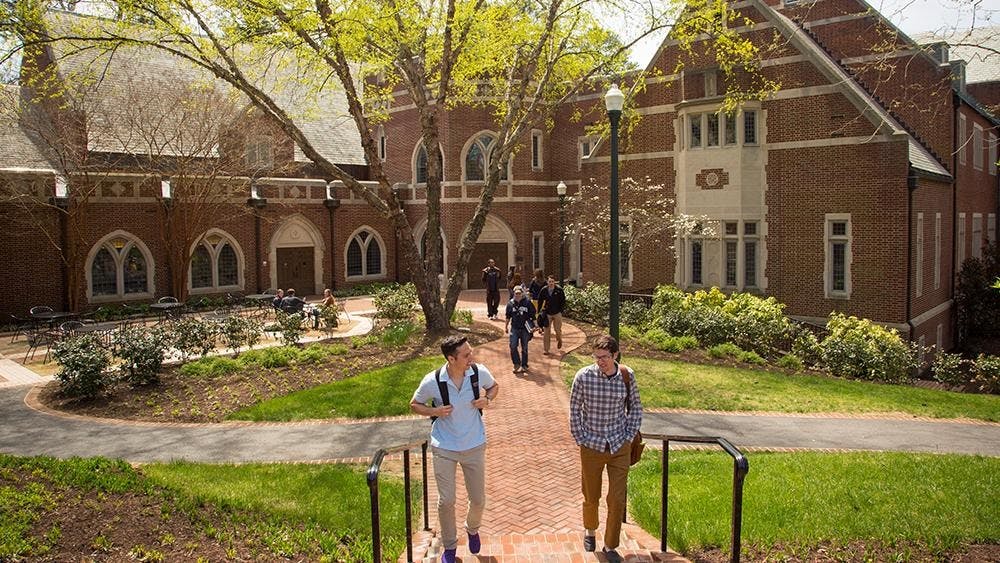Senior Claudia Ajluni was offered a paid internship in New York City for this past summer. The opportunity aligned with her career interests, and every single one of her friends would be working there, too. Ajluni decided to decline the offer and stayed home in Bloomfield Hills, Michigan, alone.
Why?
She was going to dedicate the next three months to studying for the Law School Admission Test, also known as the LSAT.
“It was really hard to be home apart from all of my friends in the city,” Ajluni said. “But I knew that it was only temporary, and I kept reminding myself how worth it it would be in the long run.”
When she arrived at school this semester, her friends hardly knew she was here, she said. Her routine was similar to that of the summer. She went to classes and studied, waking up at 7 a.m. every day, including weekends.
During the summer, Ajluni woke up each day, drove to her internship in Detroit, worked until noon, completed a practice test during lunch, worked until five, drove home, ate dinner, studied for another two-and-a-half hours and then went to sleep, she said.
Senior Thomas Vanderbeek had a similar summer schedule. He spent the month of June doing research, but devoted July and August to LSAT prep.
“July and August I self-studied while lifeguarding a bit on the side,” Vanderbeek said. Seniors Allison Abdallah, Dan Wachenfeld, Abby Smith and Mikayla Boginsky also spent their summers preparing for the September LSAT.
The LSAT is a standardized test that measures the skills deemed necessary for success in law school. Its five sections are designed to evaluate reading comprehension, management of complex information, critical thinking and the ability to evaluate and understand the arguments and reasoning of others, according to the Law School Admission Council website.
Abdallah said the skills needed for the LSAT were not typically taught in regular college subjects.
“Before you even start practicing the problems, you have to go through the whole book and learn how to understand and dissect the questions the test is asking,” she said.
Abdallah spent her summer interning and studying in Cape Town, South Africa. She worked during the day and studied after.
Enjoy what you're reading?
Signup for our newsletter
“I would get off work at 3 o'clock and post up at a coffee shop or something for two-and-a-half to three-and-a-half hours Monday through Friday, or Saturday if it was rainy,” Abdallah said.
She said that given her location in Cape Town, she had often wished she could have been at the beach or exploring with her friends.
“The LSAT was always on my mind,” she said. “I felt guilty sometimes when I just was trying to have fun with friends.”
When Abdallah arrived home from Cape Town, she continued to miss out, she said. During a big family reunion, she had to leave periodically to lock herself in her room and study. Abdallah felt pressure to not take too many breaks from studying because she worried about losing her skills, she said. “Feeling well-rested isn’t a good thing,” Abdallah said. “It means you’ve had the time to let a lot of skills go.”
Abdallah shared a common saying among law students: “You haven’t studied enough for the LSAT unless you’re ready to stab yourself in the eye with a number-two pencil.”
Wachenfeld also felt the pressure, he said. He said he had stopped himself from spending time with family, celebrating birthdays and seeing friends over the summer. During the week, Wachenfeld worked until 8 p.m., came home to eat dinner, studied and went to bed. In the week leading up to the test, the pressure began to mount, Wachenfeld said. “At one point I just wanted to cancel the test and take the November one instead,” he said.
The day these seniors had all been preparing for arrived on Saturday, Sept. 8. Ajluni walked into the T.C. Williams School of Law room ready — she had been studying in this exact room for the last few weeks.
Abdallah was about five miles away in a building at Virginia Commonwealth University.
“I wanted to take it somewhere where I could just be a fly on the wall,” she said. She got her wish, but not without the boy she shared a table with having a panic attack throughout the entire first section of the test, she said.
“He was breathing heavily and loud," Abdallah said. “And his constant erasing kept shaking the table.”
Smith also dealt with extra stressors during her test on University of Richmond's campus. “During the test, there was a cricket stuck in the wall of the room that chirped for the entire first half of the test,” Smith said. “And the air conditioning was broken because of the storm, so it was really hot.” The test proctors told Smith and the other students taking the test that they intended to notify the Law School Admission Council that the group had tested under strenuous conditions.
The conclusion of the September test is not necessarily the last that these seniors will see of the LSAT. Boginksy is planning on taking a gap year before she goes to law school, she said. She said she had always planned to take the test multiple times, but she most likely wouldn't take it again during the school year.
Abdallah is already planning for the next LSAT test date in November. She said she had given herself the week after the September LSAT off and had planned on starting to study again on Monday, Sept. 17. “The whole tornado thing wrecked my plan,” she said, "but I’m definitely going to start studying again this week.”
The others said they were waiting to reevaluate when they got their scores, all with the hopes that the stressful LSAT chapter of their lives will come to an end soon.
Contact features writer Lucy Nalen at lucy.nalen@richmond.edu.
Support independent student media
You can make a tax-deductible donation by clicking the button below, which takes you to our secure PayPal account. The page is set up to receive contributions in whatever amount you designate. We look forward to using the money we raise to further our mission of providing honest and accurate information to students, faculty, staff, alumni and others in the general public.
Donate Now



